- Home
- Muriel Spark
Reality and Dreams Page 2
Reality and Dreams Read online
Page 2
Cora sat in the bedside-chair while the day nurse, Julia, pulled Tom’s sheets straight and puffed the pillows.
‘We’d like some tea,’ said Tom.
Julia looked at her watch.
‘Never mind the time. We’d like some tea.’
Cora was so beautiful, Tom wished she were not his daughter. He looked and looked. He had always been dazzled by Cora, always besotted, always protectively chaste so that he resented any other man who was not chaste with Cora, a string of men, culminating with Johnny, whom, like a fool, she had married. She had married him for his looks which were admittedly star quality; but marriage was not a film; Cora was not a director; she had cast him in the role of a husband and he was hopeless at it. In screenplays the husband has a script to go by. Johnny had next to none.
‘Now he’s out of work,’ said Tom.
‘Who is out of work?’
‘Johnny.’
‘Oh, Johnny. He’s looking for another job. There are millions out of work.’
‘How do you manage the household budget?’
‘You sound like Mum. We haven’t had much time to budget.’
‘Oh, Cora, don’t think of maintaining a man financially. I beg you, don’t start.’
‘For better or worse…’ said Cora. ‘You marry for better or worse. I came to see how you were,’ Cora said. ‘I don’t want to talk about money, Pa.’
Julia brought in a tray of tea for two. Claire followed.
‘You have a harem to wait on you, Tom,’ she said. ‘What more can you want?’
‘My job,’ said Tom. ‘I want to finish my film but I can’t do it. Someone else will do it. I’m in bed. I’m out of work.’
‘There will be other films,’ said Claire. ‘There always have been.’
‘My film is not replaceable,’ said Tom. ‘No work of art can be replaced. A work of art is like living people.’
CHAPTER THREE
It was left to Cora, the family beauty, to break the news to her father that he had to go back into hospital for a spinal operation. Cora was now in England, staying with Claire. She had no hope of a new contract with Channel Four, and her husband, handsome Johnny, three weeks after his redundancy was declared, had disappeared to India with his severance pay. Cora did not expect to see him again.
Before telling Tom what the specialist had said about his last X-rays, ‘We have to operate on his back,’ Cora told him about her husband’s recent defection. She knew her father’s rages, both of frustration and indignation, and decided that the latter, if exhausted first, might mitigate the former.
In his sober moments he agreed with Claire about the irascibility of his nature. Shortly after she had married him Claire observed, ‘At times you act like a female hedgehog or a porcupine that has been sexually violated. All quills out, running around. A ravished porcupine, that’s what you are at such times.’
‘I know,’ he said.
It was one of these attacks that Claire feared when she sent Cora into his bedroom to tell him that he had to go back to hospital. His sense of frustration was already near the boil since he couldn’t yet walk properly. He crawled round the room slowly on an elbow-crutch. What incensed him most was when the visiting doctor told him how lucky he was to be alive, and reminded him that he had had a very bad fall.
Cora had a second mission: this was to tell Tom that the backers had withdrawn from the film. It was all folded up. The actors had gone home and Tom’s worked-over script (for he never had a full-scale screenwriter, but himself wrote a lot of the films he directed) was lying downstairs in his study. He was still unable to go downstairs, but Claire felt he would have to know sooner or later, about the odd silence surrounding his proposed film provisionally entitled The Hamburger Girl. This provisional title was believed by all to be ambiguous and Tom certainly intended to change it. He was beginning to wonder about the lack of news, except for kind messages and flowers, from the area of that film. Cora knew he would choke with indignation when he heard it had folded up. And so she preferred to channel some of his ire into frustration first.
‘Pa,’ she said straight out, ‘you need an operation on your spine next week, or you’ll never walk right again. You’re booked into the clinic.’
He was standing in the middle of his vast bedroom, leaning on two elbow-crutches.
To her amazement he said, ‘All right.’
And when she went on to tell him about the work-stoppage on his film he said, ‘Good. They would only have made a mess of it, Cora, without me.’
Claire and the nurse Julia, listening outside the bedroom door, were equally astonished.
‘Tell me,’ said Tom, ‘how Johnny came to get to India. Who paid his fare? Did you?’
‘In actual fact he took his redundancy money. It was quite a lot. Some thousands of pounds. Pa, I wasn’t going to tell you, but he’s gone.’
‘What did he give to you before he left?’
‘Nothing. He just took off.’ Cora was crying now.
‘Let him go,’ said her father. ‘Don’t ever take him back. You can get a divorce. He wasn’t ever your type and now you know it. Little egocentric swine.’
‘Johnny was so good-looking,’ said Cora. ‘We made a fine couple, let’s face it.’
‘He would never have looks as good as yours. Let’s face it,’ said Tom to his really beautiful daughter. Only to see her move half across the room was an aesthetic delight.
‘India,’ she said. ‘I said, Why India? He said, “To see my guru and a couple of temples in the south, and get lost to this materialistic hell. It’s good-bye,” he said, “for always. I’m not coming back. You can sell the sapphire ring. We can have a divorce any time you like. It’s good-bye.”‘
‘Why are you crying?’ said Tom. ‘With that sort, redundant is the very word. He is a non-necessary person.’
‘He took only a few clothes,’ said Cora. ‘And I took the rest and made a bonfire in the garden. I gave away his shoes, they were quite decent.’
‘You did right. He’ll want to come back. But don’t have him. Did he take the door-key?’
‘I suppose so.’
‘Change the lock. He’ll try to come back when his money’s run out.’
‘Oh I don’t think he’ll come back.’
‘Take my advice,’ said Tom. ‘I am old and experienced. I am old. I was already twenty when I went to the opening night of The Mousetrap. Not only am I old enough to be your father, I am your father. You should listen to me.’
When the day began to wear away Cora got ready to leave. For Tom it was the worst time of every day since his accident. He would quote Longfellow to describe his evening mood:
A feeling of sadness and longing,
That is not akin to pain,
And resembles sorrow only
As the mist resembles the rain.
‘I used to love this time of day,’ he said before Cora left. ‘The workers and staff would go home and the leading members of the cast and the directors would gather for a drink and discuss the day’s work and plan the next day’s. Now, it’s only the depressing news on the television. Claire comes with a tray of terrible food. She thinks the new cook’s wonderful. Her name is also Claire. This cook-Claire should have her ass fired right out of our kitchen with her pretentious dishes, her goulash and her hogwash and her crème-caramels furnished by the supermarket. But Claire won’t have a word said about her Hungarian cook. I don’t care what she’s suffered. Once a communist always a communist. She thinks she’s our equal and we should be grateful for her presence under my roof.’
Cora sat down again. ‘I’ll stay with you. Let’s have a drink,’ she said.
‘With all these antibiotics I’m not supposed to drink.’
‘You can have one drink,’ Cora said. ‘The doctor told Claire and Claire told me.’
‘My wife has a man,’ said Tom.
‘Claire has a man? Who?’
‘I don’t know.’
‘But if i
t’s true can you blame her,’ Cora said. ‘You have so many women.’
‘That’s part of my profession,’ Tom said. ‘Her profession is wife.’
‘You don’t sound very convincing.’
‘Well I’m not convinced, really. I don’t believe in convictions. They are generally hypocrisy.’
Claire was on the house-phone to Tom. ‘A fax has just come in. They want to continue with the film with Stan Shephard directing. They must have found the money.
‘Let him direct, I’ve lost interest,’ said Tom. ‘Wait a minute,’ said Claire, sensing he was about to hang up. ‘They want to change the title to: I’ll Kill You If You Die. I think that’s rather —’
‘No,’ said Tom. ‘The title of the movie is provisionally The Hamburger Girl. I don’t like I’ll Kill You If You Die. It ties down the meaning to a single incident, a single phase in the film. Tell them No.’
‘From what they say they want to reconstruct the film in that sense. Do you want me to bring up the fax?’
‘No. Just reply No.’
‘No what? No to the whole film, no to the new director or just no to the title?’
‘No to everything.’
‘You can’t do that. They have rights to the film. They have script rights, title rights, director rights. You know they have.’
‘Do they ask how I’m keeping?’
‘Oh yes, they say they hope you’re improving.’
‘If they have rights to everything, why are they faxing me?’
‘Out of courtesy I suppose,’ said Claire.
‘Oh, no, they’re not. Oh, no. On second thoughts, don’t reply. Don’t answer. If they have all these rights they won’t bother me again. If they don’t they’ll write again. You should ask Fortescue-Brown the lawyer in any case. He got up the contract, let him get on with it.’
This time he hung up before Claire could say a word. The nurse, Julia, had a large over-toothed smile on her face. ‘The good news,’ she said, ‘is that you don’t have to undergo another operation. There was a misdiagnosis, too hasty, but fortunately the surgeon noticed in time. It was a question of the X-rays.’
‘Is this the surgeon like a ghost who never comes into a room and never goes out of it but just materialises and vanishes?’
‘That’s him. Mr. Gladstone Smith.’
‘Oh, a Mr. Smith. Does he know what he’s talking about?’
‘He certainly does. You don’t need to go back to hospital. You’re going to be all right.’
‘As soon as I hear a bit of news these days,’ said Tom, ‘someone comes along to contradict it. My film was cancelled now it’s going ahead. My son-in-law was looking for a job but now he’s left my daughter and gone for a holiday in India. First I had to go back to hospital and now I don’t.’
‘That’s life,’ said Julia.
‘No, it’s not ordinary life. But let me tell you that for people in the film business, yes, it is life. Nothing with us is consistent.’
CHAPTER FOUR
Tom’s daughter by his second marriage, Marigold, and her husband James, lived (when he wasn’t on his literary travels) in a large cottage in a village in Surrey. They were both very serious people — too serious for Tom, but who was to say that he was the just arbiter of other people’s character? Simply because he was always ready to assume that part, and others only too ready to listen to him with dazzled conviction is not to say that Tom was always right (although generally there was something in what he said). When James was away Marigold lived alone, but at this moment she had James’s elder brother, Ralph and his wife Ruth to stay with her. Ralph and Ruth had come down from London at Marigold’s invitation to get over the trauma of Ralph’s redundancy and to sort themselves out. They were in their early thirties, with two children away at school. The fact of the approaching school holidays gave Marigold a sense of confidence that, because of the children coming home, the couple could not stay with her very long as otherwise they might have been tempted to.
In the meantime Marigold indulged her gift for philosophising, if not sermonising. After supper, the very first night of their stay, she spoke.
The two in-laws sat on a dismal blue sofa, side by side. Marigold, worthy as any woman or man in the works of George Eliot, unlovely, graceless, sat in an upright chair opposite. (How had Tom managed to conceive her? And Claire, so emotionally imaginative?) Marigold spoke:
‘Perhaps nobody,’ Marigold said, ‘should take on responsibilities which would demand more expenditure than would be gained from the dole and the income support schemes. Full pay has a surplus which should not be used for necessities such as house purchases or school fees unless a private income covers those expenditures. In other words, if all lived austerely, redundancy would bring no shock to the person or the family. My point number two is that employed persons should have an alternative source of income, for example, the income deriving from the invested surplus of a good salary not put to full expenditure. My third point is that every breadwinner should have in mind if not at hand an alternative career of a robust nature to step into if the first one fails.’
(Perhaps Marigold’s only resemblance to Tom was that she indulged in monologues. But was this inherited or only copied?)
Ralph said, ‘It’s too late for me, all this advice.’ He had been a manager of liaison personnel in a vast branch of an international electronics firm. He had been laid off with twenty-three others. Ralph looked at his watch, saw that it was six o’clock, time for a drink, went over to the drinks tray and helped himself to a gin and tonic. He said, ‘Can I get you girls anything?’
‘Scotch and soda,’ said Ruth.
‘A diet Cola,’ said Marigold, who looked decidedly put out by Ralph’s proprietary actions. ‘I hope,’ she said, ‘you have signed on with a B.A. and let them have your C.V. with a claim for A.P.L.’
‘What are B.A., A.P.L.?’ said Ruth.
‘Benefits Agency; Accreditation of Prior Learning. C.V. means curriculum vitae which means —’I know that one,’ said Ruth.
‘So do I,’ said Ralph. ‘If you mean am I applying, or looking, for other jobs, well, yes, at least I mean to do so.’
‘You need to find your L.A.’s U.B.O. and perhaps put in for some E.T.’
‘Oh certainly,’ said Ralph, ‘every time.’
Marigold looked disappointed. ‘Do you know what these letters stand for? Of course you don’t. L.A. is Local Authority, U.B.O. is the unemployment benefit office of your L.A. E.T. is Employment Training which you will no doubt need if you are adaptable to a new occupation. These terms of reference should be known to you. They are known to me so why shouldn’t they be known to you?’
Ruth said, ‘One lives and learns. In the meantime we have my pay to live on.
‘Still you should have some I.S.’ (By this Marigold meant Income Support but Ralph and Ruth enquired no further.)
‘I saw in the papers,’ Ruth said, ‘that your father had a fall. How is he?’
‘Still physically impaired, but otherwise more exasperating than ever. He’s home now, keeping to his room for the time being. I suppose the nursing home was glad to get rid of him. He made passes at the youngest nurses and cheeked up to the older ones. I was there in his room when one of these older women came to check his temperature and so on. She asked him, “Have your bowels acted?” He said, “Yes, have yours?” That was the sort of thing. I’m sorry for my mother, coping with him at home. There’s a nurse, of course, eating into the family fortunes. My half-sister Cora eggs him on. She rang me up. She said, “I’ve told Pa to keep on the night nurse too if he wants it. That’s what money is for.”‘
‘Will he direct films again?’ said Ralph.
‘Maybe and maybe not. He’s writing a lot at the moment. Probably a film script. But there’s no knowing what the shock has done to his abilities. I hope he has an insurance and an S.D.A., otherwise —’S.D.A.?’ said Ruth.
‘Severe Disablement Allowance,” Marigold pronounced slowly to Rut
h, as if to a cretin. ‘Otherwise my mother will have to support him.’
‘Oh but she’s so wealthy,’ said Ralph.
‘You’d be surprised,’ said Marigold, ‘to know how much dependent members of a family can deplete a fortune.’
‘Oh, obviously,’ Ruth said. ‘But look, those Blantyres from upstate New York are very, very, well off.’
‘And flourishing,’ said Ralph. ‘Blantyre Biscuits Inc. are away ahead. Surely your mother has suffered no loss by her marriage, no deprivation. She’s still a Blantyre with Blantyre money and a famous husband.’
‘There comes a time,’ said Marigold. ‘However, there comes a time when one has to see things sub specie aeternitatis. Which means,’ she said, turning to Ruth, ‘under the light of eternity. That is what my parents now have to do. Examine their utility, their service ability, their accountability, their duties and commitments, instead of respectively womanising and manising as they have done in the past, as they continue to do, and as they no doubt mean to do.’
‘What else should they do?’ said Ruth.
‘They could get a divorce, for a start,’ said Marigold. ‘Oh no,’ protested Ralph and Ruth almost simultaneously.
‘My mother has a man,’ said Marigold. ‘I think his name’s Charlie. The phone rang several times when I was there. Once my mother ran to pick up the receiver; she said, “That’s Charlie.” Evidently it was Charlie. And when I asked her how did she know it was Charlie’s call, she said, “I know his ring.” That means she’s besotted.’

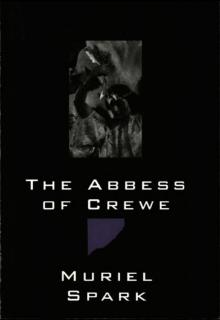 The Abbess of Crewe: A Modern Morality Tale
The Abbess of Crewe: A Modern Morality Tale Reality and Dreams
Reality and Dreams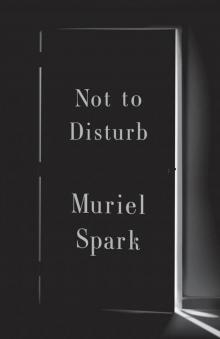 Not to Disturb
Not to Disturb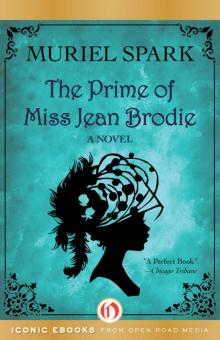 The Prime of Miss Jean Brodie
The Prime of Miss Jean Brodie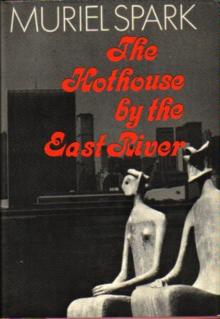 The Hothouse by the East River
The Hothouse by the East River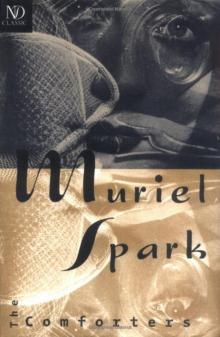 The Comforters
The Comforters (1958) Robinson
(1958) Robinson Unknown
Unknown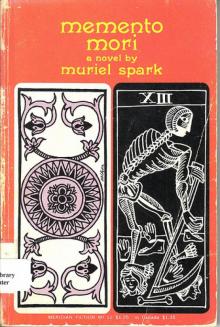 Memento Mori
Memento Mori The Finishing School
The Finishing School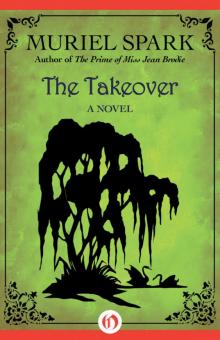 The Takeover
The Takeover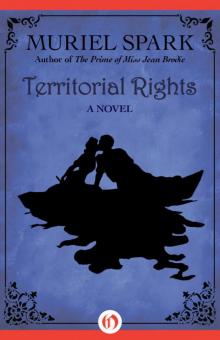 Territorial Rights
Territorial Rights The Complete Short Stories
The Complete Short Stories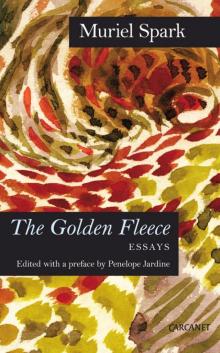 The Golden Fleece: Essays
The Golden Fleece: Essays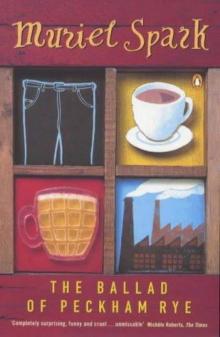 The Ballad of Peckham Rye
The Ballad of Peckham Rye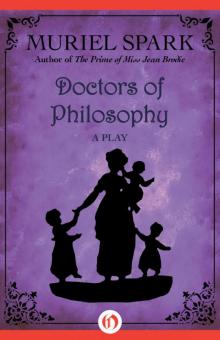 Doctors of Philosophy: A Play
Doctors of Philosophy: A Play The Mandelbaum Gate
The Mandelbaum Gate Loitering With Intent
Loitering With Intent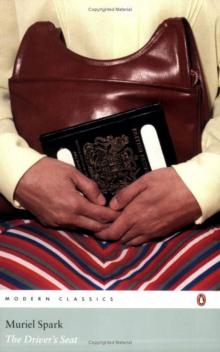 The Driver's Seat
The Driver's Seat Complete Poems: Muriel Spark
Complete Poems: Muriel Spark Symposium
Symposium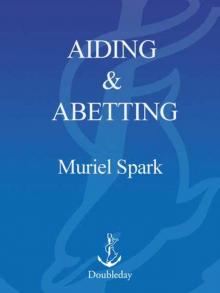 Aiding and Abetting
Aiding and Abetting The Golden Fleece
The Golden Fleece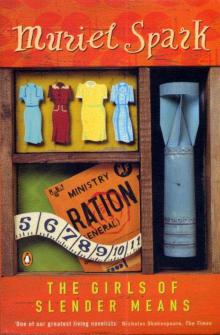 The Girls of Slender Means
The Girls of Slender Means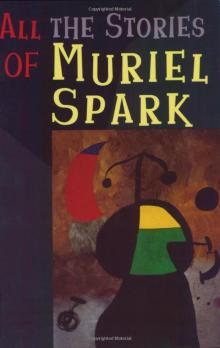 Alice Long’s Dachshunds
Alice Long’s Dachshunds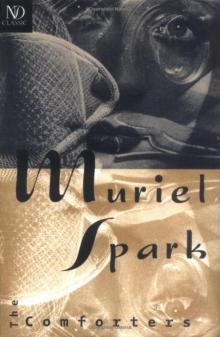 (1954) The Comforters
(1954) The Comforters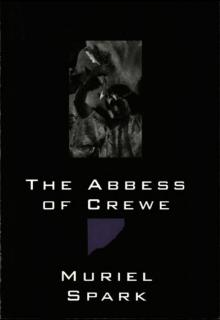 The Abbess of Crewe
The Abbess of Crewe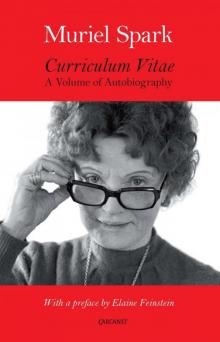 Curriculum Vitae
Curriculum Vitae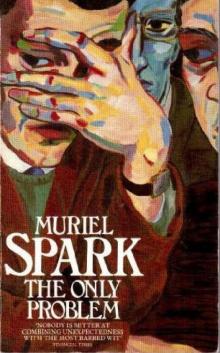 The Only Problem
The Only Problem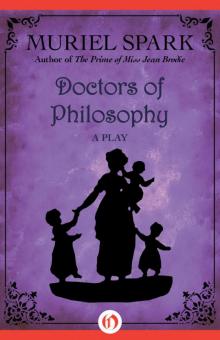 Doctors of Philosophy
Doctors of Philosophy